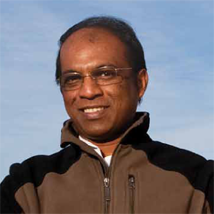By now, Sampath De Silva likely knows better. Just a few months ago, the Sri Lankan engineering  instructor decided to leave the University of Calgary for Lethbridge College for the “warmer” winters he and his family would find farther south.
instructor decided to leave the University of Calgary for Lethbridge College for the “warmer” winters he and his family would find farther south.
So, Sampath, how’s that working out for you?
De Silva is part of Lethbridge College’s goal of fostering an international atmosphere, drawing to its campus top-notch instructors from around the world to glean their global expertise and learn from their cultures.
De Silva was a great catch: he has a doctorate in environmental engineering, a knowledge base tailored for the Engineering Design and Drafting Technology and Civil Engineering programs in which he teaches.
He has a wide range of industrial experience in the fields of road, geotechnical, hydraulics and coastal engineering. In addition, while working at the University of Ruhuna, he did a lot of consultancy work in the fields of health care waste management, water quality, and environmental impact assessments. At the University of Calgary, he researched work related to bio-cell technology to re-use areas under landfills.
But he also brings a global experience gained from world travel: after obtaining his civil engineering degree in Sri Lanka, De Silva added a master’s in hydraulics from Thailand and a doctorate in environmental engineering from the University of South Florida.
Immediately after returning to Sri Lanka with his Ph.D., De Silva started to work as a senior lecturer in the faculty of engineering at the University of Ruhuna in Galle, Sri Lanka, but it was a little difficult for his wife to find suitable employment in Galle.
“Canada was my first choice because of the health care and because it’s close to the United States, where our youngest was born,” says De Silva. “It’s beneficial for her to be in Canada.”
After serving four years at the University of Ruhuna, Sampath decided to emigrate to Canada to give his wife Roshanee, a doctor, a shot at becoming a consulting physician. After receiving permanent residency status, he applied to universities in Canada.
In July 2007, the family emigrated to Canada; De Silva accepted a post-doctoral position at the University of Calgary. Within 10 months he was able to obtain his professional engineer designation from the Association of Professional Engineers, Geologists, and Geophysicists of Alberta.
When the one-year position expired – and after a Calgary winter – he figured Lethbridge would offer warmer climes. The weather might not have lived up to his expectations, but Lethbridge College hasn’t disappointed.
“This was a very welcoming place,” says De Silva. “I want to stay here, for my career and my family.”
The De Silvas have two other children; all three attend Mike Mountain Horse Elementary, a school De Silva praises for its inclusiveness.
Roshanee is still jumping through the required hoops to become certified in Alberta, a province with a shortage of GPs.
“Maybe I’m lucky, but I had no problem finding work here,” says De Silva. “But my wife is still trying for her residency.”
Courses offered by the Teaching and Learning Centre at the University of Calgary helped De Silva improve his teaching and presentation skills to secure the position at Lethbridge College.
The couple faces no language barrier: English is taught in Sri Lanka from Grade 3 on. While the De Silvas have not found other Sri Lankan families in Lethbridge, they are far from homesick.
“We’re excited to have a person of Sampath’s calibre and international experience on our faculty,” says Dennis Sheppard, chair of engineering technologies. “He brings enhanced learning for our students as our first Ph.D.; he can better prepare them for employment outside of Canada; and he exposes our faculty to the possibilities of higher education.”
Sheppard notes the inclusion of a Ph. D. on the faculty allows Lethbridge College to plan for the day when it offers a bachelor of technology degree in the School of Engineering Technologies, and a degree in alternative energy management in the school of environmental sciences.
“I also believe our faculty and our learners benefit from being exposed to global cultures,” says Sheppard.


